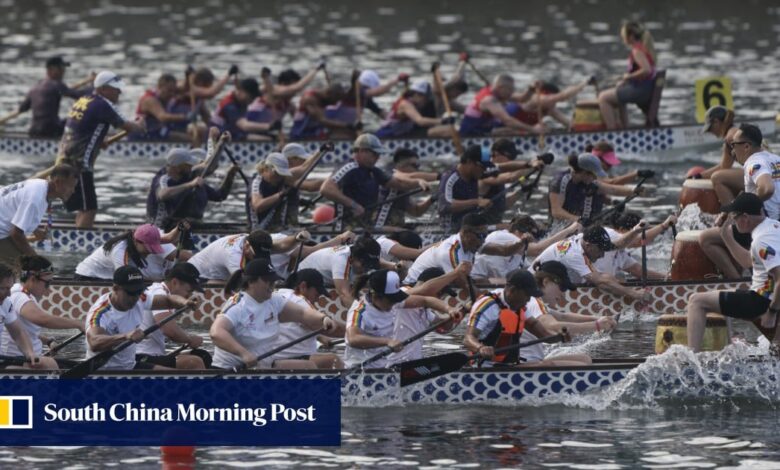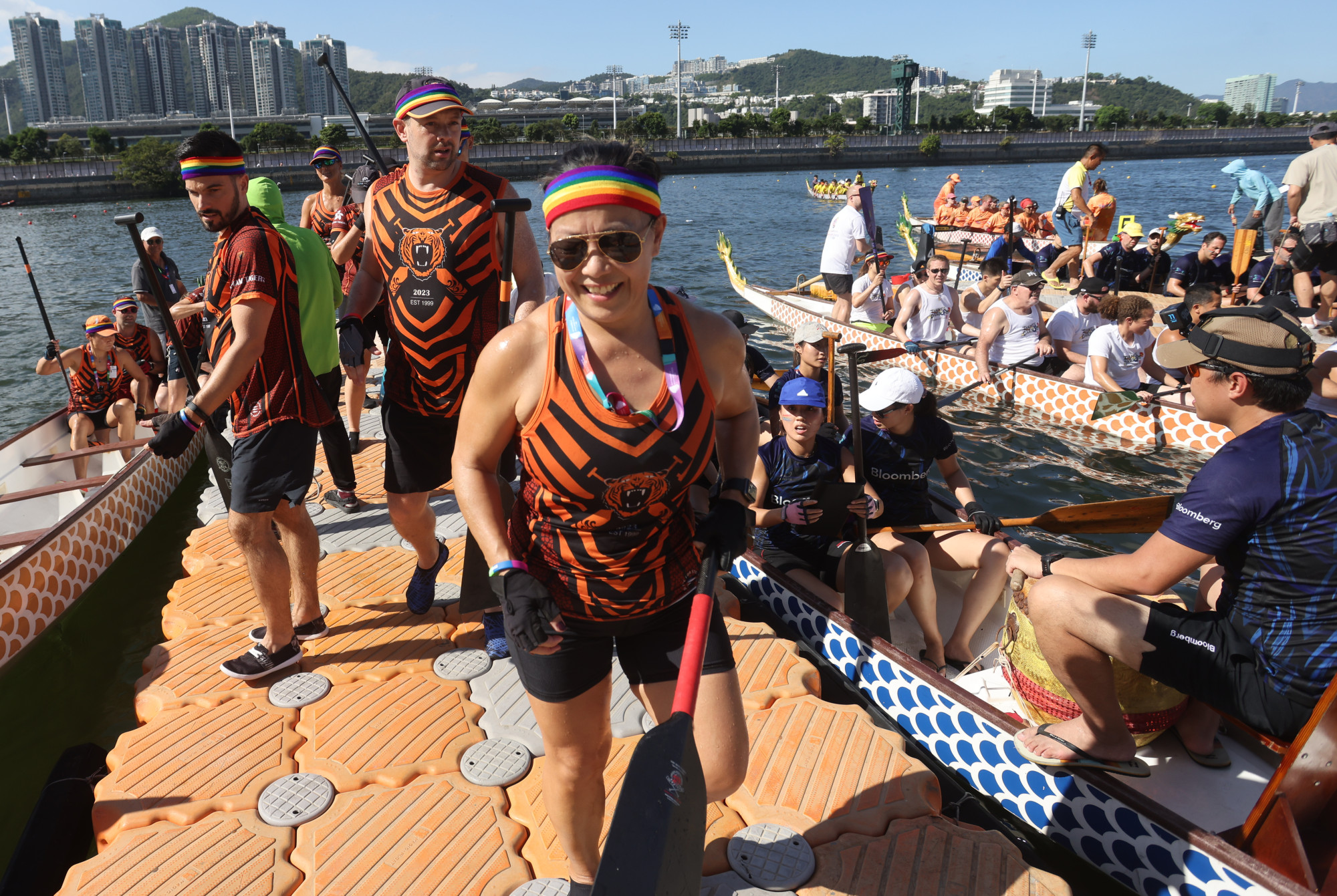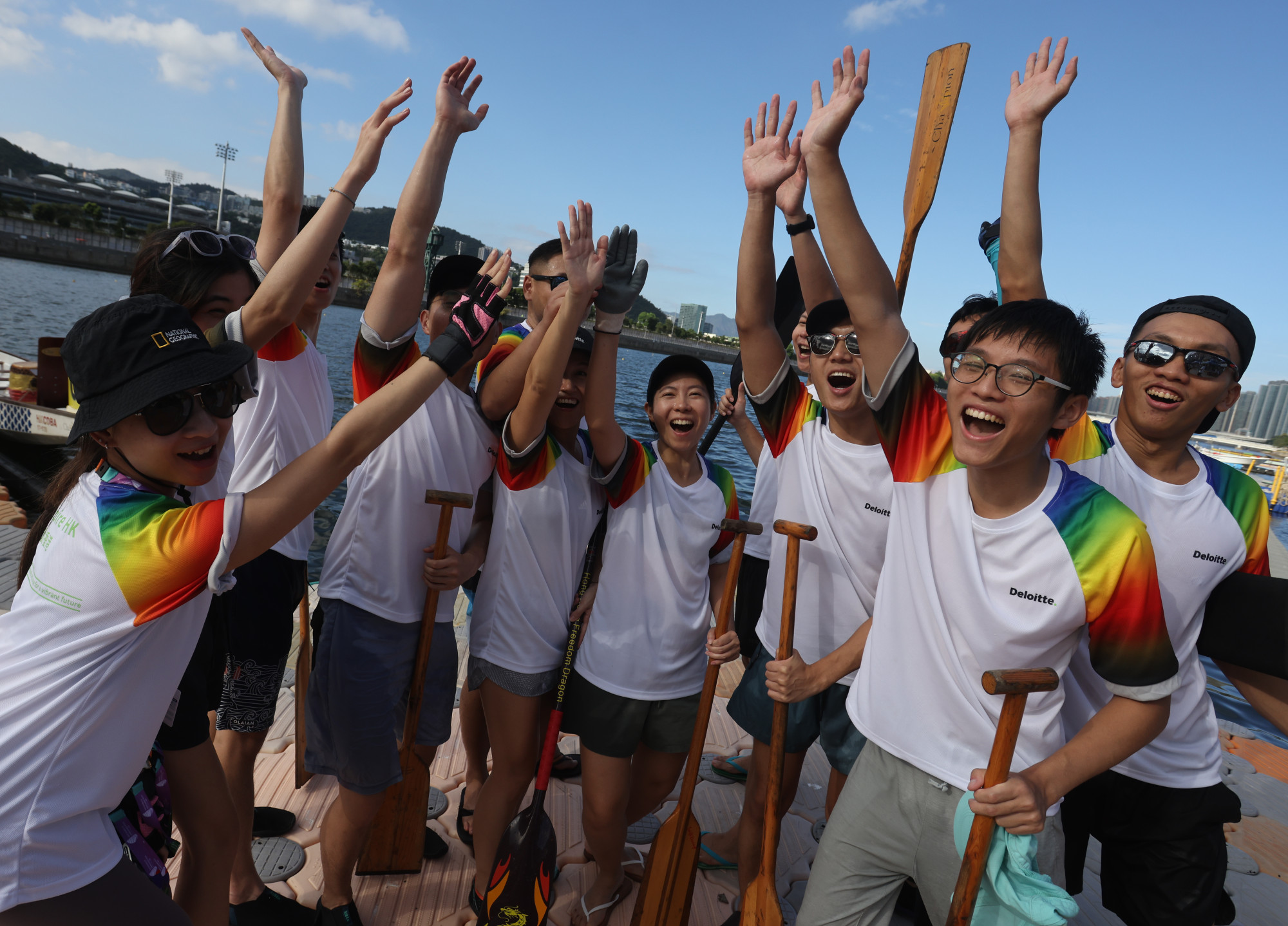‘Thrilled to be here’: Hong Kong Gay Games athletes in high spirits after dragon boat race, but some raise concerns over contest preparations

[ad_1]
Contestants at the Hong Kong Gay Games were in high spirits on Sunday evening after wrapping up a full day of sporting events, but some raised concerns over the extent of preparations ahead of other competitions.
Among those joining the Games’ dragon race was data analyst Eric Siso, who travelled to the city from Sydney, Australia, with 35 others to compete alongside his teammates from the Different Strokes.
“I’m thrilled to be here and glad I decided to come,” the 45-year-old said.
However, Siso said the competition’s schedule, facilities and registration information were all provided “pretty last minute”.
Regina Ip says Hong Kong Gay Games is ‘creating history’, amid calls to cancel
Regina Ip says Hong Kong Gay Games is ‘creating history’, amid calls to cancel
More than 500 competitors took part in the dragon boat race at the HKCDBA Training Centre, along Shek Mun’s Shing Mun River. Organisers said the 8-hour event at 10am was the most popular among contenders so far.
Organisers said about 11 of the 44 teams competing in the race were from overseas, 17 were from city-based companies, another two were composed of individual sign-ups and the remainder comprised local dragon boat groups.
A Post reporter observed that the spectator turnout was low and largely consisted of the contestants’ friends and family, or residents who happened to stop by the river.
Police also deployed about 10 officers in two vans to a nearby car park, while venue security was handled by a private company.
No signs were put up around the surrounding area to promote the Games.

Lawyer Niall Daws, 39, who travelled from London with his Thames Dragons teammates said the group were enjoying the Games.
“It’s been great fun,” he said. “There are plenty of teams, which is always good and some really strong competition.”
The contestant also described opposition to the event on national security grounds as “laughable”.
On November 1, seven anti-LGBTQ lawmakers called for the Game to be cancelled over claims the event allegedly subverted traditional Chinese values and posed a national security risk.
David Ko, the Games’ director of marketing and public relations, hit back at the legislators during the launch ceremony on Saturday and stressed the event aimed to strengthen inclusion.
“The Gay Games is a non-political sports, art and culture event that aims to promote diversity and inclusion,” he said. “Mr [Junius] Ho trying to draw a connection to the [national security law] is irrelevant, ridiculous and risks making Hong Kong an international laughing stock.”
Hong Kong Gay Games rejects claims event is political or gets foreign state funding
Hong Kong Gay Games rejects claims event is political or gets foreign state funding
Other contestants during the Games expressed concerns over the level of organisation before various competitions, including a Hong Kong freelance designer who gave his name as Jack and said he would compete in the 5km open water swimming race at the Victoria Recreation Club in Deep Water Bay next Saturday.
“I received a lot of information about the opening ceremony, gala concerts and after-party, but no route map or information on the number of buoys, yet,” the 34-year-old said.
Jack added that he had taken part in a similar event in Discovery Bay at the end of September and received a route map months in advance.

Other athletes also cited a lack of refreshments at sporting events and said they were told to bring their own, despite some paying a HK$1,500 (US$191) registration fee and another HK$800 to compete.
“[Gay Games Hong Kong organisers] made it clear that there is no food or drinks at the racetrack [or other events],” said Ricky, a Hongkonger who travelled from Canada with his partner for the marathon at Pak Tam Chung next Saturday.
“I have never heard of a marathon that does not have refuelling stations. This is very different to the Paris Games in 2018.”
The route map showed four water stations, but Ricky and several other contestants said they believed the spots were public drinking fountains.
A Games spokesman said some event venues did not have licences to offer food and drinks, adding the policy was also a way of reducing waste.
He also attributed the poor communication between organisers and athletes to a “system error”.
Regina Ip says she has never backed same-sex marriage amid Hong Kong Gay Games row
Regina Ip says she has never backed same-sex marriage amid Hong Kong Gay Games row
“People would register through the system, and we kept the enrolment open for longer because of Covid-19 and to get more participants, so there is more data which could lead to a system error,” the spokesman said.
Some competitors may have missed out on contest information because they had input their data incorrectly, he added.
About 2,400 participants from 45 locations are competing in the Hong Kong leg of the Games, which consists of 18 events and wraps up next Saturday. A further 2,400 people are competing in contests co-hosted in Guadalajara, Mexico.
Hong Kong is the first Asian city to host the Games since the event was established in 1982.
[ad_2]
Source link





